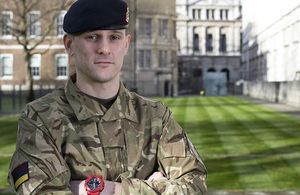Army medic receives Queen’s Commendation for Valuable Service
Corporal Ben Spittle, of the Royal Army Medical Corps Army Reserve, has been recognised in the latest Operational Awards and Honours.

Corporal Ben Spittle [Picture: Crown Copyright]
In his civilian life, Ben Spittle, 30, works as a paramedic for the London Ambulance Service.
But in his military role, on 9 Nov 2013, Private Spittle, as he was then, was working as an advisor to a team of Afghan National Army (ANA) medics on an operation to destroy Taliban insurgent strongholds.
He was in the first month of his deployment and on his first operation. That morning the ANA sustained several casualties, all requiring immediate treatment and evacuation.
Private Spittle said:
At first it was just one or two, but then more and more casualties were brought into our check point (CP) in quick succession, so we had a lot to deal with.
Inside the small breezeblock building that was acting as a medical facility, Private Spittle battled desperately alongside the ANA medical team to save the lives of the seriously wounded. He soon found himself managing a major mass casualty medical incident.
Private Spittle said:
Initially we were there as advisors, the idea was that we would let the Afghan medics treat the walking wounded and we would take a more proactive role with the more seriously injured. That was why we were there, so they could gain experience and confidence. But that was on the assumption that there would only be one casualty at a time. It turned out not to be like that.
Demonstrating inspirational leadership and command presence while simultaneously performing complex medical triage, Private Spittle took control.
Despite the stretcher areas being full of the seriously wounded, the casualties still kept coming. Spittle worked with a remarkable composure that belied his junior rank. With the CP under Taliban small arms fire, his personal example reassured and rallied those around him when they were in danger of becoming overwhelmed by the scale of the task facing them.
Private Spittle said:
Every medic knows that there is a sink or swim moment, and I felt we were reaching that point, and I realised it would be easier if we took command.
With only his issued medical pack and some rudimentary Afghan supplies to rely upon, Private Spittle simultaneously treated multiple gunshot traumas, catastrophic haemorrhaging, shattered femurs, serious chest wounds and compound fractures.
Later, in barracks, Private Spittle pioneered and delivered a paramedic ‘En Route Care’ course to the ANA. Such was the demand for this course, and the obvious lifesaving capability it provided; it became oversubscribed and was subsequently rolled out across the other three Brigades.
Private Spittle said:
The thing you learn as a medic and you learn it quickly, I learned this in the Army and in London Ambulance, is that when someone needs you they need you. There’s no hiding. There’s no waiting for help – you are it, you are the bottom line. Although being given this award means a lot, just knowing I’ve been put forward for it is honour enough.